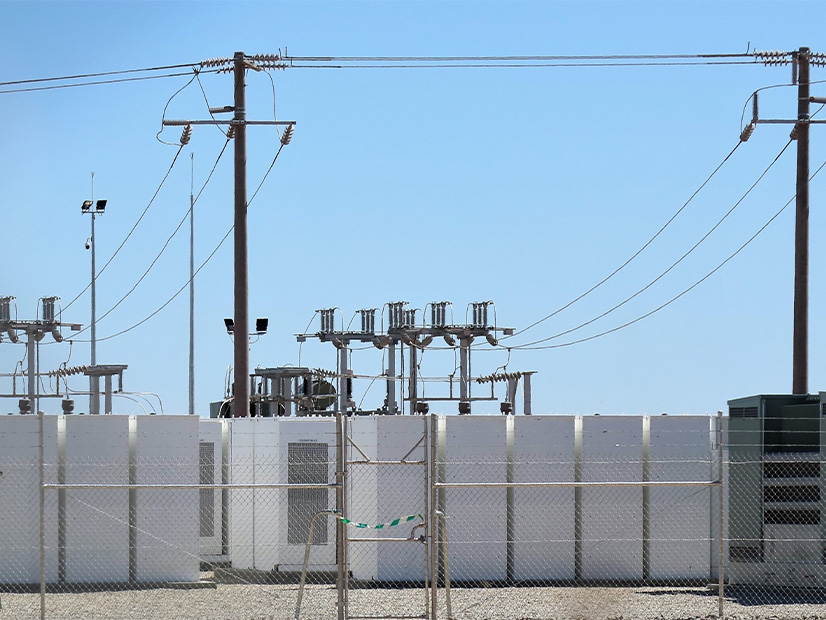FERC last week ruled that three municipal power providers would not violate their full requirements power contracts by installing battery storage, which the commission determined does not count as the sort of generation they are obligated to purchase exclusively from Appalachian Power Company (APCO).
Under their agreements with APCO, Craig-Botecourt Electric Cooperative and the Virginia cities of Radford and Salem are obligated to purchase their power exclusively from the utility, aside from some pre-existing generation in the two cities.
The three entities rely on the services of Blue Ridge Power Agency, a non-profit formed to negotiate wholesale electric power purchase contracts and monitor their performance for its members. Blue Ridge filed an instant petition with FERC on Aug. 10, 2021, asking that the commission rule that use of storage is permissible within the terms of the contracts because it is not a form of generation and is not prohibited under the agreements (EL21-97).
APCO argued that, because the contracts do not allow for the installation of behind-the-meter generation for the purpose of peak shaving, they should be read with the understanding that other methods of reducing peak load, such as demand response programs, are not permissible.
APCO estimated that $8.5 million in expenses would be shifted to its other customers should the petitioners be allowed to install batteries and use them for peak shaving, largely the result of costs associated with building the transmission the utility was required to meet peak demand, but which it could not recoup through demand charges based on the highest hourly usage in a billing month.
Blue Ridge argued that, since the contracts with APCO address the potential for variation in their energy use and both cities have already participated in PJM’s demand response program, the methods of shifting their load are permissible under the contract, as long as the energy is ultimately procured from APCO.
Blue Ridge additionally contended that the contracts do not preclude its members from reducing demand, “but rather only preclude meeting that demand from sources other than APCO, and that the Blue Ridge Members accordingly retain ‘the right to use storage, demand response, load management, or other peak-shaving technologies or programs,’” the order noted.
FERC agreed with Blue Ridge with respect to the contracts with the cooperative and two cities.
“While these three agreements do not expressly mention battery storage investments, when read in context and in their entirety, these agreements support Blue Ridge’s position that such investments are permitted under the agreements,” the commission wrote.
“The agreements focus exclusively on generation, and the exclusive nature of both APCO’s status as sole provider, and each customer’s obligation to purchase generation during the delivery period from APCO alone,” the commission continued. “The contracts define full requirements electric service as ‘the supply of firm energy to be provided by [APCO] to the customer at the delivery points, as the same may fluctuate in real time to serve customer’s retail load . . .’”
However, FERC ruled that a fourth party to the petition, Virginia Polytechnic Institute and State University, would be in violation of its full requirements agreement with APCO should it install batteries which, together with generation, would amount to more than 2.35 MW — the highest amount of behind-the-meter generation the university’s full requirements agreement allows for.
Unlike the other three contracts, the university’s agreement with APCO specifies that storage is to be considered a form of generation, a categorization the majority of the commissioners disagreed with but determined does subject batteries to the same contractual limitations as traditional generation.
Commissioners Danly, Christie Dissent
Commissioners James Danly and Mark Christie dissented from the ruling on the grounds that they did not believe that FERC should exercise its jurisdiction in a matter they believed was a contractual dispute that could have been resolved by the Virginia courts, an argument APCO made in its filings as well.
“The fact that the subject of the contract dispute happens to be battery storage units instead of bucket trucks or office equipment is no reason for us to assert jurisdiction and impose a preferred result,” Christie wrote.
The issue of jurisdiction largely centered on interpretation of three factors laid out in the Arkansas Louisiana Gas Co. v. Hall case, in which FERC declined to take jurisdiction in 1979. The majority in the Blue Ridge order determined that the commission met each requirement: possession of special expertise that makes the case peculiarly appropriate for commission decision; a need for uniformity of interpretation; and a case that is important in relation to the regulatory responsibilities of the Commission.
Danly also argued that each of the contracts should be read in the context of the Virginia Tech agreement, which was agreed upon in 2019, two years after the other three, since it was drafted prior to subsequent FERC rulings on the distinctions between generation and storage. The order, he said, could create a pathway for future petitions to seek to introduce new provisions to their contracts through the commission.
“The import of this order is that if your full requirements contract is silent as to this or that matter or if it fails to expressly prohibit a particular thing, then any such practice, might it later be at issue, can now be permitted by the commission, when it wants. This is absurd; this is not how contracts work. This decision will inevitably lead to confusion and disruption of other full requirements contracts and will encourage a slew of future petitions for declaratory orders seeking to reform extant contracts by inserting unnegotiated, uncontemplated, and unanticipated elements,” he said. “Contracting parties beware.”




